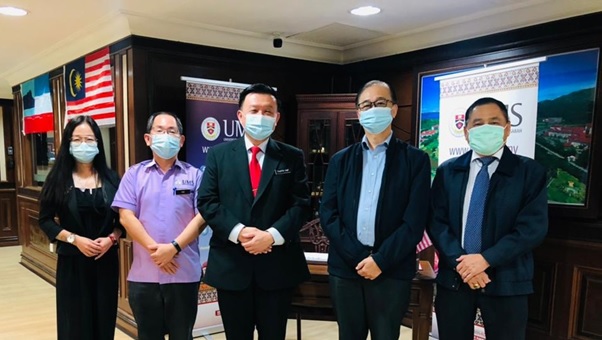
Yap (middle), during a courtesy call from Yong (second right) and his delegation, has expressed his intention to organize the second Malaysia Global Chinese Muslim Conference in Sabah, while Yong (second left) offered his support for the event.
KOTA KINABALU: Malaysia Maritime Silk Route Research Society led by president Prof Datuk Dr Wilson Yong Tung Yung has had an in-depth dialogue with Universiti Malaysia Sabah (UMS) vice chancellor Professor Datuk Dr Taufiq Yap Yun Hin on the collaboration between the Department of Islamic Development (Jakim) and the university’s Faculty of Food Science and Nutrition on Halal certification recently.
Yap, who is also the president of Malaysia Chinese Muslim Association (MACMA), said the association has held the Malaysia Global Chinese Muslim Conference in Kuala Lumpur from July 25 to 27, 2019, in conjunction with the 25th anniversary of MACMA and 45 years of Malaysia-China diplomatic relations.
He said more than 300 invitees, including Chinese Muslims from China, Hong Kong, Taiwan, Indonesia, Singapore and Thailand, as well as leaders or representatives of Malaysia’s government agencies and non-governmental organizations (NGOs) have attended the conference.
Yap said there were many misconceptions among academicians, government departments, media and the general public on Islamic nations and their citizens.
He said Islam was often associated with extremists and terrorism and many were oblivious to the past glory of Islamic civilization, nor did they know that Islamic teachings espoused honesty, courtesy, kindness, peace, truthful, purity, patience, discipline, transparency, humility and other virtues.
He said Western countries have described China as an atheist state, while Islamic scholars were also oblivious to the religious tolerance in Chinese civilization.
Yap said China and Islamic civilizations ought to strengthen their understanding of each other to establish long-lasting cooperation.
Meanwhile, Yong said fostering people-to-people ties under the Belt and Road Initiative (BRI) required special attention because the initiative connected many countries and diverse cultures.
Through developments under the BRI framework, he said China has created an economic community involving Central Asia, Europe, South Asia, West Asia, Arabian Peninsula, Southeast Asia and Africa whereby the political systems, legislation, customs, languages, religions and cultures were massively different from one another.
“We have to learn the differences in effort to respect local traditions and customs.
“In doing so, we ensure positive interaction with the local governments and people that is based on mutual respect, which enables us to build closer relations.”
In effort to enhance understanding and communication with Muslims in countries along the Belt and Road route and contribute towards promoting goodwill among people under the BRI, Yap has expressed his intention for Sabah to host the second Malaysia Global Chinese Muslim Conference.
Yong supported the suggestion and offered his assistance in organizing the event.
On another note, Yong represented Malaysia Maritime Silk Route Research Society in expressing his gratitude to UMS for jointly organizing the webinar ‘BRI Symposium 2020 on Safety Regulatory Challenges of Transnational Biotechnology Research and Development Projects’ on December 9 last year.
He also handed over RM1,000 monetary sponsorship from the event to Yap.
The post Many misconceptions on Islamic nations – UMS vice chancellor appeared first on Borneo Post Online.


